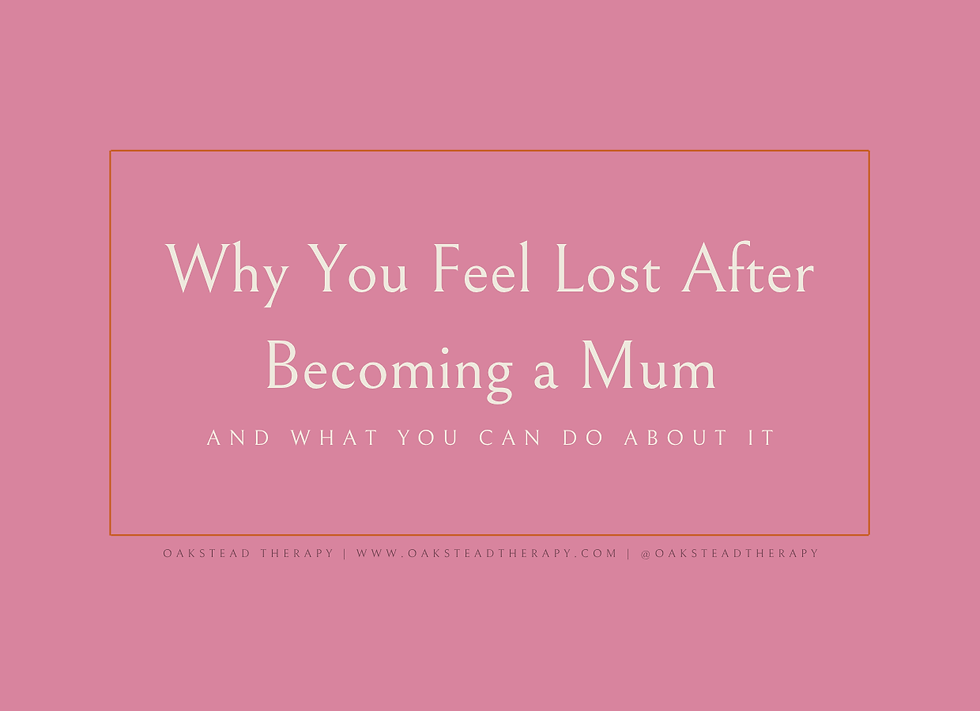Supporting Yourself Through Postpartum Changes: Physical, Emotional, and Identity Shifts
- Jul 5, 2025
- 3 min read
Updated: Aug 1, 2025

Becoming a mother changes everything - your body, your heart, your mind, and your sense of who you are. While this transition can be beautiful and meaningful, it's also often overwhelming, uncomfortable, and lonely.
Many women prepare for labour and delivery, but few are truly prepared for the postpartum experience - the messy, raw, in-between space where you're no longer pregnant, but still figuring out what it means to be you now.
In this blog, we'll explore the three major layers of postpartum change: physical, emotional, and identity - and how you can support yourself through each one with more self-compassion and less pressure to 'bounce back'.
Physical Changes: Slowing Down, Not Snapping Back
The physical recovery after birth is often underestimated. Whether you had a vaginal birth, a caesarean, or anything in between, your body has just undergone a massive transformation.
Common physical changes include:
Healing from stitches, tears, or surgery
Bleeding (lochia) for weeks after birth
Breast changes (engorgement, leaking, discomfort)
Hormonal fluctuations that can impact energy, mood, and sleep
Aches, pains, and overall exhaustion
The pressure to 'bounce back' can make it hard to listen to what your body really needs: rest, nourishment, and time.
Ways to support your physical recovery:
Give your body permission to rest. Recovery is not a race.
Fuel yor body with nourishing meals and plenty of water.
Seek postpartum-specific health support. Pelvic floor physios, lactation consultatns, and maternal health nurses are your allies.
Move your body gently. Walking, stretching, or simply changing positions can help, but there's no need to rush back into exercise unless you're ready.
Your body just created, birthed, and is now sustaining life. That's extraordinary. It deserves tenderness, not urgency.
Emotional Changes: it's Okay Not to Be Okay
The emotional rollercoaster of postpartum is real. In the early days, your hormones are shifting rapidly, sleep is scarce, and the weight of responsibility can feel overwhelming.
Common emotional experiences:
Mood swings, weepiness, or irritability
Feelings of joy and connection mixed with sadness, grief, or anxiety
Emotional highs and lows that feel unpredictable
For many mothers, there's also a deep grief that can arise - grief for your old life, your freedom, your familiar sense of self.
Sometimes, these feelings settle as you find your rhythm. But if they linger or intensify, it might not signal postnatal depression, anxiety, or adjustment difficulties - and that's a sign to reach out, not a sign of failure.
Ways to support your emotional health:
Talk to someone safe. This could be a friend, partner, GP, or counsellor.
Normalise mixed emotions. It's possible to love your baby and still find motherhood hard.
Ask for help early. You don't need to wait until you're in crisis to deserve support.
Practice self-compassion. Remind yourself: "I'm doing the best I can with what I have."
Identity Changes: Who Am I Now?
One of the biggest, but least talked about, postpartum shifts is identity loss and rediscovery.
You might wonder:
Who am I now that I'm a mum?
Where did the "old me" go?
Will I ever feel like myself again?
Motherhood often rearranges your priorities, routines, and sense of purpose. It can feel like you've disappeared under the weight of nappies, feeding schedules, and mental load.
Ways to support your evolving identity:
Create small rituals that are just for you. A cup of tea, a walk alone, listening to music you love.
Reconnect with your values. Ask: "What matters to me in this season of life?"
Find spaces where you can exist beyond 'mum'. This might be therapy, hobbies, social groups, or quiet solo moments.
Give yourself time. Your new identity won't arrive fully formed. It's something you gently grow into.
Motherhood doesn't erase who you are. It layers you. It evolves you. And it's okay if that process feels a little messy or confusing.
Final Thoughts: You Deserve Support
The postpartum season is not just about adjusting to your baby - it's about adjusting to the new version of yourself.
Supporting yourself through this time means:
Giving your body grace
Giving your emotions room
Giving your identity time to unfold
You don't have to walk this road alone. If you're feeling lost, overwhelmed, or simply need a space to land, therapy can help.
You are allowed to take up space. You are allowed to ask for help.
You are doing better than you think.




Comments